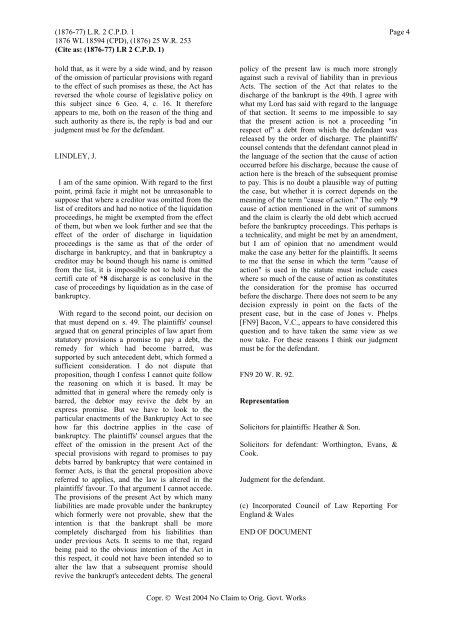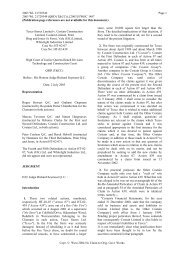In Re Bonacina Le Brasseur v Bonacina - Thomson Reuters
In Re Bonacina Le Brasseur v Bonacina - Thomson Reuters
In Re Bonacina Le Brasseur v Bonacina - Thomson Reuters
You also want an ePaper? Increase the reach of your titles
YUMPU automatically turns print PDFs into web optimized ePapers that Google loves.
(1876-77) L.R. 2 C.P.D. 1 Page 41876 WL 18594 (CPD), (1876) 25 W.R. 253(Cite as: (1876-77) LR 2 C.P.D. 1)hold that, as it were by a side wind, and by reasonof the omission of particular provisions with regardto the effect of such promises as these, the Act hasreversed the whole course of legislative policy onthis subject since 6 Geo. 4, c. 16. It thereforeappears to me, both on the reason of the thing andsuch authority as there is, the reply is bad and ourjudgment must be for the defendant.LINDLEY, J.I am of the same opinion. With regard to the firstpoint, primâ facie it might not be unreasonable tosuppose that where a creditor was omitted from thelist of creditors and had no notice of the liquidationproceedings, he might be exempted from the effectof them, but when we look further and see that theeffect of the order of discharge in liquidationproceedings is the same as that of the order ofdischarge in bankruptcy, and that in bankruptcy acreditor may be bound though his name is omittedfrom the list, it is impossible not to hold that thecertifi cate of *8 discharge is as conclusive in thecase of proceedings by liquidation as in the case ofbankruptcy.With regard to the second point, our decision onthat must depend on s. 49. The plaintiffs' counselargued that on general principles of law apart fromstatutory provisions a promise to pay a debt, theremedy for which had become barred, wassupported by such antecedent debt, which formed asufficient consideration. I do not dispute thatproposition, though I confess I cannot quite followthe reasoning on which it is based. It may beadmitted that in general where the remedy only isbarred, the debtor may revive the debt by anexpress promise. But we have to look to theparticular enactments of the Bankruptcy Act to seehow far this doctrine applies in the case ofbankruptcy. The plaintiffs' counsel argues that theeffect of the omission in the present Act of thespecial provisions with regard to promises to paydebts barred by bankruptcy that were contained informer Acts, is that the general proposition abovereferred to applies, and the law is altered in theplaintiffs' favour. To that argument I cannot accede.The provisions of the present Act by which manyliabilities are made provable under the bankruptcywhich formerly were not provable, shew that theintention is that the bankrupt shall be morecompletely discharged from his liabilities thanunder previous Acts. It seems to me that, regardbeing paid to the obvious intention of the Act inthis respect, it could not have been intended so toalter the law that a subsequent promise shouldrevive the bankrupt's antecedent debts. The generalpolicy of the present law is much more stronglyagainst such a revival of liability than in previousActs. The section of the Act that relates to thedischarge of the bankrupt is the 49th. I agree withwhat my Lord has said with regard to the languageof that section. It seems to me impossible to saythat the present action is not a proceeding "inrespect of" a debt from which the defendant wasreleased by the order of discharge. The plaintiffs'counsel contends that the defendant cannot plead inthe language of the section that the cause of actionoccurred before his discharge, because the cause ofaction here is the breach of the subsequent promiseto pay. This is no doubt a plausible way of puttingthe case, but whether it is correct depends on themeaning of the term "cause of action." The only *9cause of action mentioned in the writ of summonsand the claim is clearly the old debt which accruedbefore the bankruptcy proceedings. This perhaps isa technicality, and might be met by an amendment,but I am of opinion that no amendment wouldmake the case any better for the plaintiffs. It seemsto me that the sense in which the term "cause ofaction" is used in the statute must include caseswhere so much of the cause of action as constitutesthe consideration for the promise has occurredbefore the discharge. There does not seem to be anydecision expressly in point on the facts of thepresent case, but in the case of Jones v. Phelps[FN9] Bacon, V.C., appears to have considered thisquestion and to have taken the same view as wenow take. For these reasons I think our judgmentmust be for the defendant.FN9 20 W. R. 92.<strong>Re</strong>presentationSolicitors for plaintiffs: Heather & Son.Solicitors for defendant: Worthington, Evans, &Cook.Judgment for the defendant.(c) <strong>In</strong>corporated Council of Law <strong>Re</strong>porting ForEngland & WalesEND OF DOCUMENTCopr. © West 2004 No Claim to Orig. Govt. Works
















